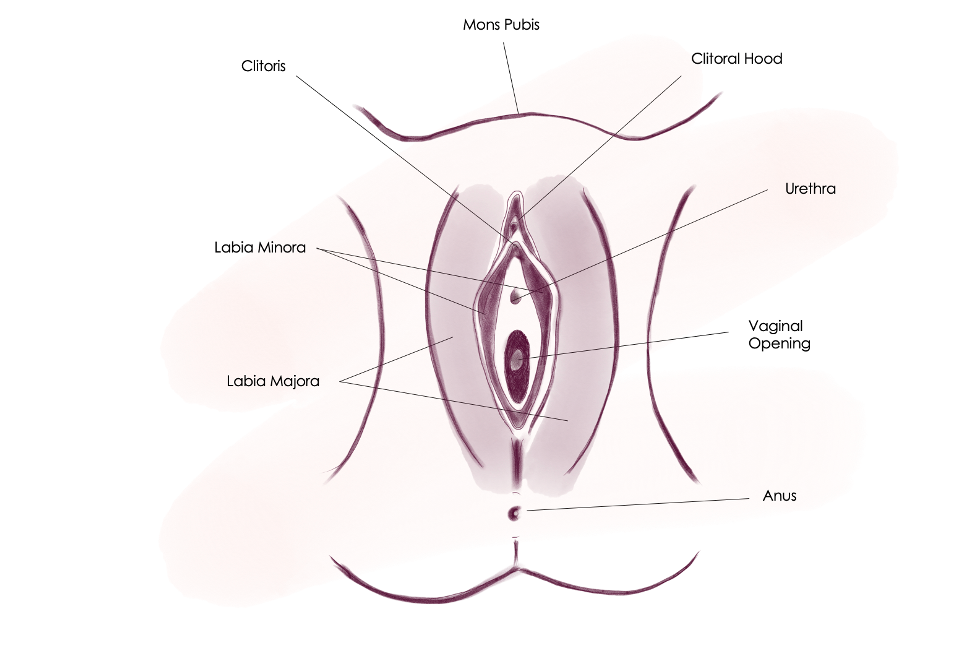Female Anatomy 101: The Vulva & Vagina
- Sara Harris

- Oct 19, 2023
- 3 min read
Let’s take a look at the difference between the vulva and vagina – as they are so often blended into one!
Vulva
The vulva is often incorrectly referred to as the vagina. However, the vagina is in fact on the inside and the vulva is on the outside. The vulva includes the inner and outer lips called the Labia Minora and the Labia Majora. The Labia Majora (outer lips) are what you can visually see. Hair will naturally grow here as a girl moves through puberty and into womanhood. These outer layers are protecting the inner, more sensitive layers. The Labia Minora (inner lips) are another layer of protection for the opening to the very delicate inner structures and organs such as the vagina, the cervix, the uterus and ovaries. They secrete lubrication from oil glands to keep you slightly moist and comfortable. In some women, the Labia Minora may extend beyond the Labia Majora or sometimes they may be tucked inside. And sometimes one side may be bigger than the other. As with all parts of our body, there is no right or wrong here and no one way to be, and there is lots of variation from woman to woman.

The tissue of the vulva is very delicate. The fact that it is more ‘discrete’ and delicate in nature, reminds us that we are to treat this area of our body with much attentiveness, care and tenderness. It is an area of our body that is very sensitive and asks us to be considerate and honouring of this fact.
Vagina
The vagina is a canal or opening that leads from outside the body, extending inward from the vulva, to the cervix and then to the uterus. This canal is not open all the time. It is a muscle, so it is at rest most of the time with the walls of the vagina touching. The vagina is like an enclosed pouch. Something to note – there are two other openings on either side of the vagina. Towards the front is your urethra which is where urine passes and towards the back is your rectum, where faecal matter (poo) passes. Your vagina is the opening in the middle. The walls of the vagina feel a bit bumpy and this is normal. Your menstrual blood comes down through this canal when you have your period. And when a woman has a baby, this is the opening it moves through.

Keeping clean
This is also a very sensitive part of your body. Amazingly, it is self-cleaning so you don’t need to do anything in that regard. Keeping your vulva clean is super important of course using mild soaps or soap substitutes, but no need to wash inside your vagina. It naturally has a very acidic environment so keeps itself in check.
If you do ever feel itching, pain or discomfort in this area, make sure you see your doctor and attend to it as required. This may be caused by an infections, a skin condition, pelvic floor muscle tightness, nerve or tissue damage from surgery or possibly from childbirth.
Moving into menopause
When a woman reaches perimenopause and menopause, she may notice some changes in the vulva and vagina area. This can be due to changes in oestrogen levels, particularly oestradiol which is responsible for keeping the vagina moist, the thickness and elasticity of the tissue, maintaining genital blood flow and also supports in maintaining a healthy vaginal microbiome.
A woman’s lifestyle is super important here, ensuring she is eating good quality fats such as extra virgin olive oil, avocados, nuts and seeds and staying hydrated by drinking enough water.
Looking at stress and how to deal with it rather than just managing it becomes vital in this stage of life as the impact on hormone levels can lead to much discomfort for women in various ways.
Many women face the reality of having a dry vagina and experiencing painful sex – there are many supportive ways to approach this which I will detail in another article.
If we pay attention to our body in the detail that it asks for and requires, then we may appreciate more, the delicate areas such as the vulva and the vagina for the incredible organs that they naturally are. And with that, care for and respect and honour this area of our body to the degree it deserves.




Comments